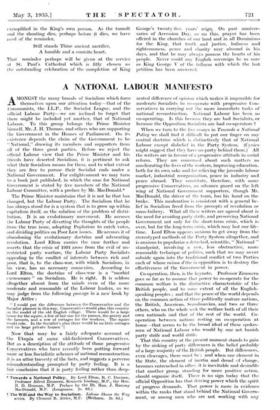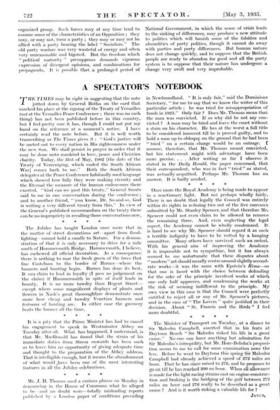A NATIONAL LABOUR MANIFESTO
AMONGST the many brands of Socialism which force themselves upon our attention today—that of the Communists, the I.L.P., the Socialist League, and the official Labour Party—we are inclined to forget that there might be included yet another, that of National Labour. To this group belongs the Prime Minister himself, Mr. -J. H. Thomas, and others who are supporting the Government in the Houses of. Parliament. On its existence depends the claim of the Government to be National," drawing its members and supporters from all of the three great parties. Before we reject the official :Labour view that the Prime Minister and his friends • have deserted Socialism, it is pertinent to ask what their Socialism means for them, and to what extent . they are -free to pursue their Socialist ends under a National Government. For enlightenment we may turn to a book just published, in which the case for National Government is stated by -five members of the National Labour Committee, with a preface by Mr. MacDonald.* The Prime Minister maintains that it is not he that has changed, but the Labour Party. The Socialism that he has always stood for is a system that is to grow up within capitalism itself, as the solution of the problem of distri- bution. It is an evolutionary movement. He accuses the Labour Party of diverting the thoughts of the people from the true issue, adopting Poplarism to catch votes, and dividing politics on Poor.Law issues. He accuses it of abandoning the evolutionary doctrine and advocating revolution. Lord Elton carries the case further and asserts that the crisis of 1931 arose from the evil of un- restricted party warfare, the Labour Party Socialists appealing: to the conflict of interests between rich and poor, that is, to the class-war, with which Socialism, in his view, has no necessary connexion: According to Lord _ Elton; the doctrine of class-war is a "morbid excrescence " on Socialism. He is right. It is seldom altogether absent from the minds even of the more moderate and reasonable of the Labour leaders, as we may judge from the following passage in 'a new book by Major Attlee ; "-I would put the difference between the Conservative and the Socialist planner in this way, Conservatives would plan this country on the- model 'Of the old English village. There would be a large betise for the squire, a few of fair size for the parson, the gentry and the farmeni, and a row of cottages for the workers. The squire would rule. In the Socialist's plan there would be no little cottages and no large private houses." j Now that may be a fairly adequate account of the Utopia 0 some , old-fashioned Conservatives. But as a description of the attitude of those progressive Conservatives who have recently been putting forward more or less Socialistic schemes of national reconstruction it iS.an uttertravesty of the facts, and suggests a perverse mismideratanding prompted by party feeling. It is a fair conclusion that it is party feeling rather than deep- .
* Towards a National Policy. By Lord Elton, R. C. Davison, Professor Alfred Zimmern, Kenneth Lindsay, M.P., the Hon. Denman, M.P. Preface by the ,Rt. Hon. J. Ramsay MacDonald, M.P. (Longmans. 2s. lid.) . 1- The Will and the Way to Socialisni. Labour Shows the Way series. By Clement "R. Attlee, M.P. (Methuen. 2s. 6d.) seated difference of opinion which makes it impossible for moderate Socialists to co-operate with progressive Con- servatives in carrying out the more immediate tasks of national reconstruction. National Labour has been so cp-operating. Is this because they arc bad Socialists, or because the Opposition Socialists are bad co-operators ?
• When we turn to the five essays in Towards a National Policy we shall find it difficult to put our finger on any central doctrine which is distinctively that of National Labour except disbelief in the Party System. (Cynics might suggest that they have no party behind them.) All the writers are in favour of a progressive attitude in social reform. They are concerned abotit such matters as ameliorating the lives of the workers, improving education, both for its own sake and for relieving the juvenile labour market, industrial reorganization, peace in industry and peace abroad. They constitute, therefore, with some progressive Conservatives, an advance guard on the left wing of National Government supporters, though Mr. MacDonald, the driver of the team, has his hand on the brake. This moderation is consistent with a general be- lief in Socialism freed from the precepts of revolution or mass-bribery. What all these writers are agreed about is the need for avoiding party strife, and preserving National Government not only for the short-term crisis, which is over, but for the long-term crisis, which may last our life- time. Lord Elton appears anxious to get away from the stereotyped methods of the Party System altogether, and is anxious to popularize a detached, scientific, " National " standpoint, involving a new, less obstructive, more reasonable technique of polities, such that we may never subside again into the traditional conflict of two Parties each of whose raison d'etre in opposition is to destroy the effectiveness of the Government in power.
Co-operation, then, is the keynote. Professor Zimmern goes so far as to assume that power to co-operate for the common welfare is the distinctive characteristic of the British people, and to some extent of all the English- speaking peoples ; and that the peace of the world depends on the common action of three politically mature nations, the British, American. Scandinavian, and two or three others, who on the whole seek the welfare both of all their own nationals and that of the rest_ of the world. Co- operation between nations resting on co-operation _at homethat seems to be the broad ideal of these spokes- men of National Labour who would by one act banish party strife and world strife. That this country at the present moment stands to gain by the sinking of party differences is the belief probably of a large majority of the British people. But differences, even cleavages, there must be ; and when one element in the State, the element of inertia and dread of change, becomes entrenched in office, it is inevitable and desirable that another group, standing for more positive action, should organize itself. There is no sign today that the official Opposition has that driving power which the spirit of progress demands. That power is more in evidence within the ranks that stand behind the National Govern- ment, or among men • who are not working with any organized. group. Such forces may at any time tend to assume some of the characteristics of an Opposition ; they may, or may not, form a party ; they may or may not.be allied with a party bearing the label " Socialism." The old party warfare was very wasteful of energy and often very unreasonable and bigoted. But the freedom which " political maturity " presupposes demands vigorous expression of divergent opinions, and combinations for propaganda. It is possible that a prolonged period of National Government, in which the sense of crisis leads to the sinking of differences, may produce a new attitude to politics which will banish some of the falsities and absurdities of party politics, though it cannot do away with parties and party differences. But human nature does not change quickly, and to suppose that the British people are ready to abandon for good and all the party system is to suppose that their nature has undergone a change very swift and very improbable.















































 Previous page
Previous page